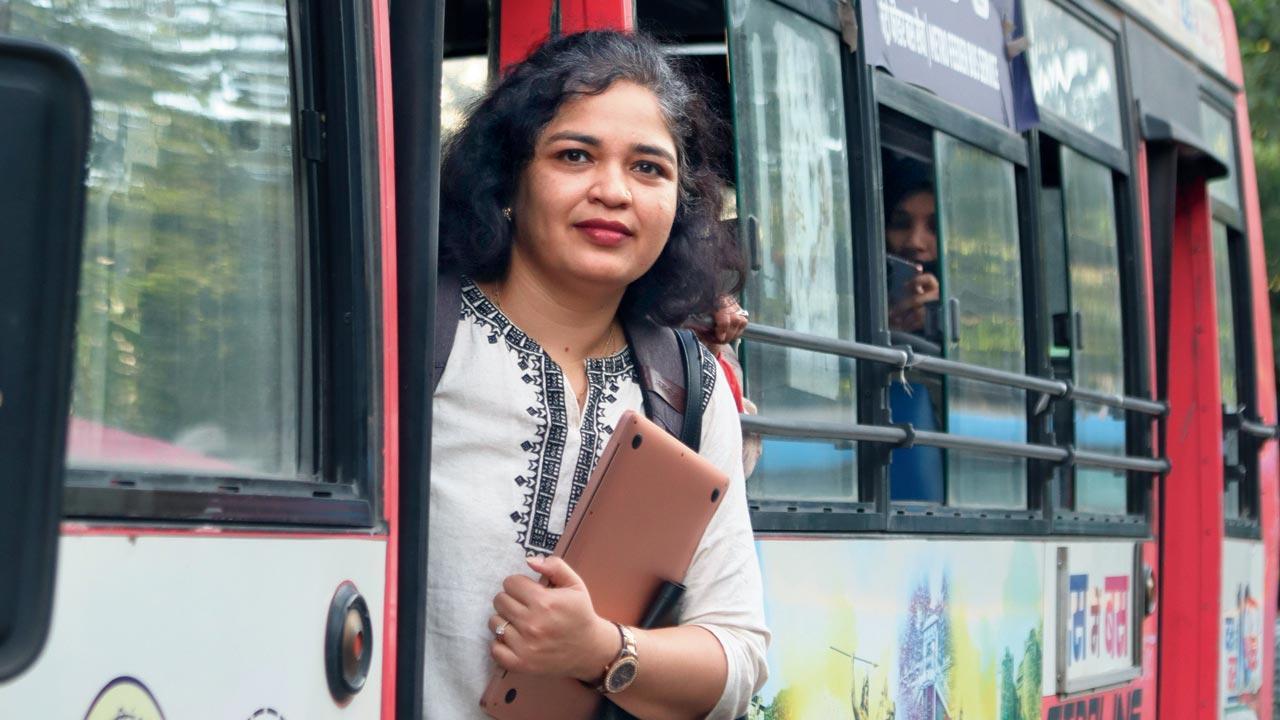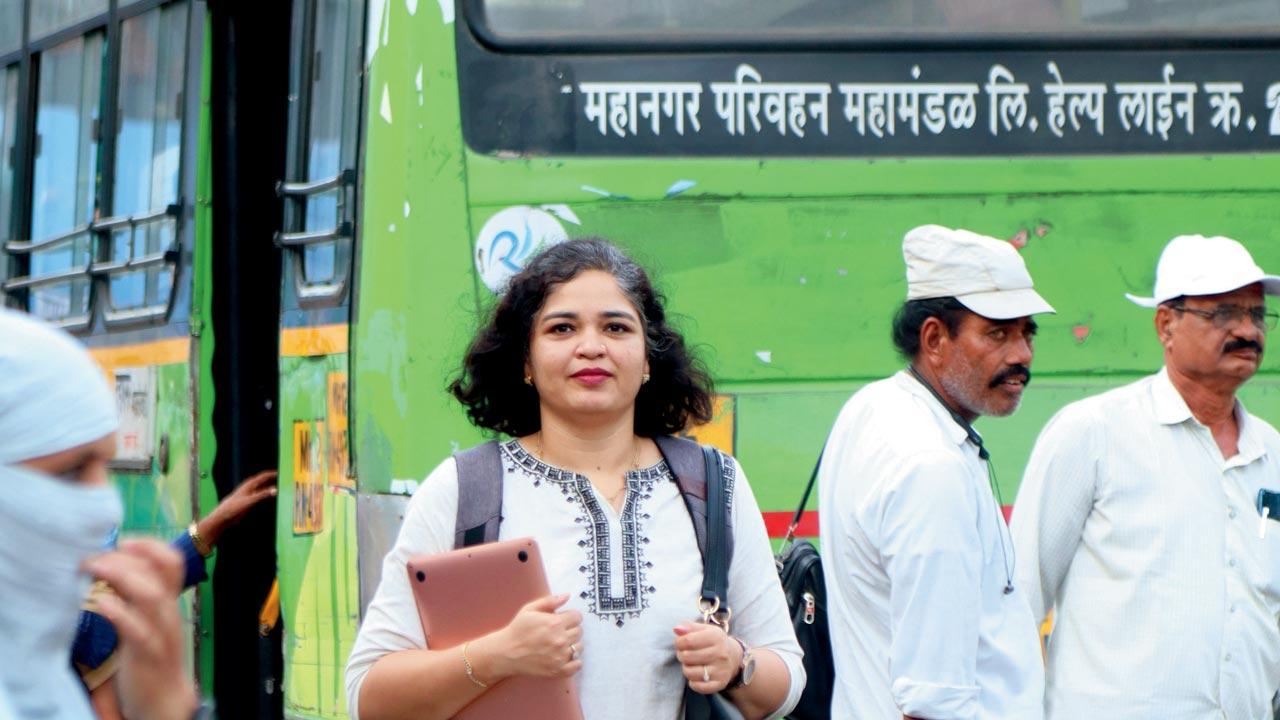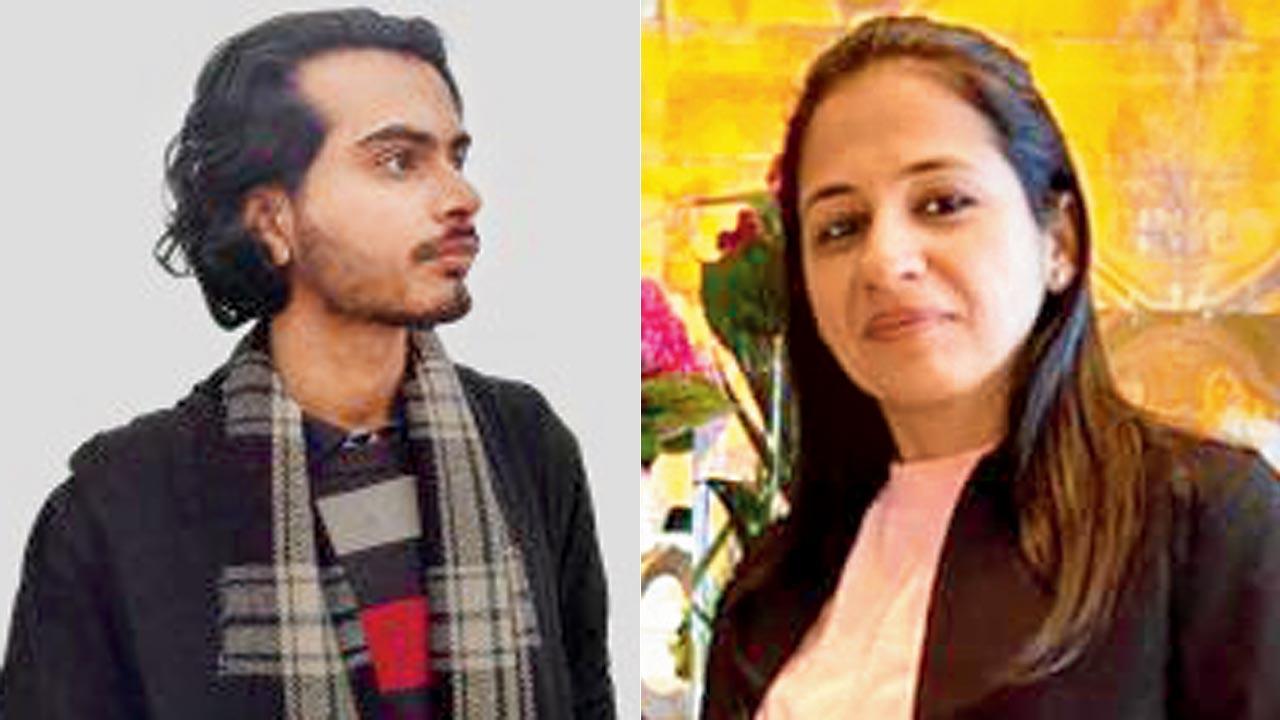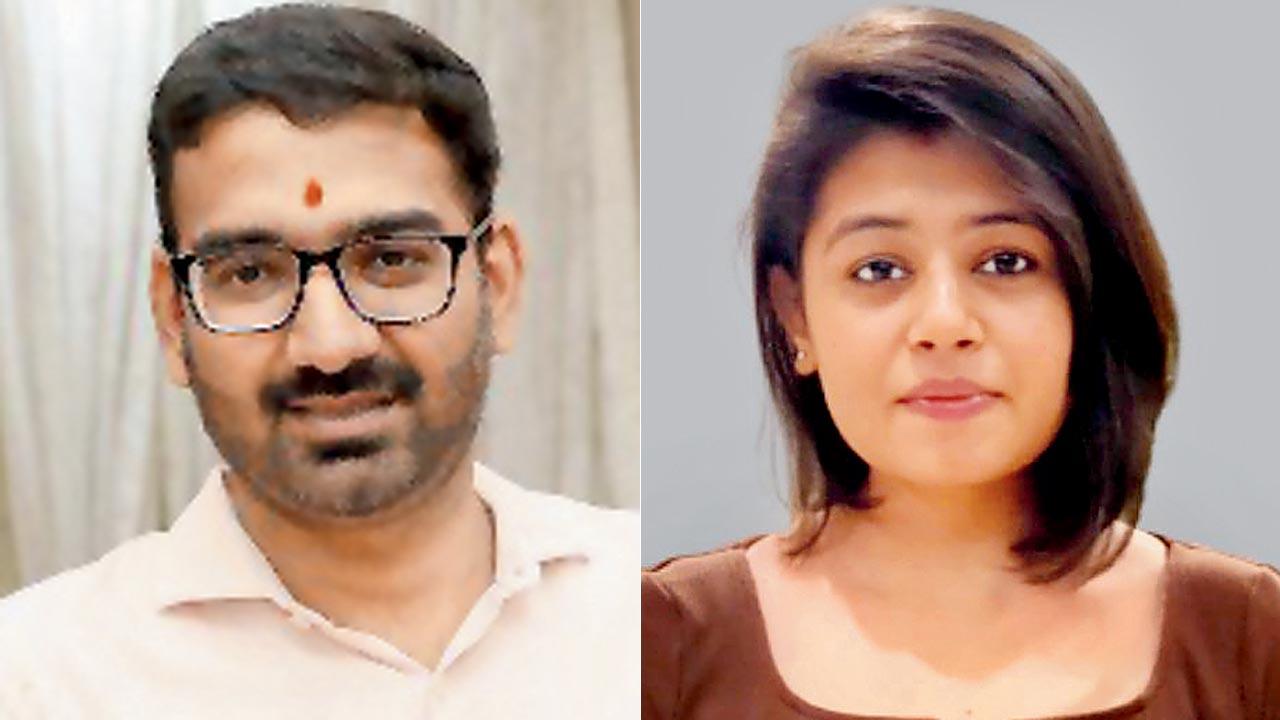An inability to monetise, parental resistance and a continuing skewed perception of sex is standing in way of sex education initiatives in creating impact in cities and villages

Madhavi Jadhav is the co-founder of an web-based app called atman.care that works exclusively with the government in rural areas, including in Nanded via collaboration with the district collector. Pic/M Fahim
What are flavoured condoms? What’s 69? What does the middle finger mean? What does f***k mean? What’s porn? Who’s [adult movie actor] Mia Khalifa? How do gay men have sex? What is oral sex? What is anal sex? Why do women moan?
ADVERTISEMENT
These are questions from students as young as Class 2 and 4, going up to Class 11. Anju Kish, a certified sex educator and Founder of UnTaboo, a Safety and Sexuality Education Company based out of Juhu, is talking about her experience in schools.
“They overhear these words, see things on television, and when adults get shocked at such questions, the children get curious and turn to the Internet.” And thus, Pandora’s Box is opened. “This can be resolved by creating a safe space at home for open discussions and regularly engaging with these topics, and not just as a trigger reaction to heinous events around us,” adds Kish, who began her work in safety in sex as an independent sex educator 13 years ago. In 2016, she officially consolidated her company, and now works extensively with city schools.
 Madhavi Jadhav is the co-founder of web app Atman.care that works exclusively with governments via District Magistrates to include concepts such as consent in rural India, including Nanded. Pic/M Fahim
Madhavi Jadhav is the co-founder of web app Atman.care that works exclusively with governments via District Magistrates to include concepts such as consent in rural India, including Nanded. Pic/M Fahim
“The talk” is not common yet in all Indian households, if it happens at all. But the rape and murder of a resident doctor at Kolkata’s RG Kar Medical College has sparked conversations in living rooms. A few days after the rape, the terror lurked closer with the news of sexual assault of two four-year-olds at a school in Badlapur. The panic among parents became palpable: How to talk about sex? What tools can we use? Who can help navigate the nuances of consent and give us a vocabulary suited to children?
It’s a problem noted by the highest judicial authority in the country: The Supreme Court. On September 23, the apex court while including downloading, storing, circulating and watching child pornography under the Protection of Children from Sexual Offences Act (POCSO), drew correlation between sex education and sexual violence. The Court referred to a study of over 900 adolescents in Maharashtra which found that those not exposed to scientific literature on reproductive and sexual health were more likely to engage in early sexual activity. Comprehensive sex education, the Court said, teaches youth about consent and the legal ramifications of sexual activities.
It has been over 200 years since the country was a very open society,” says Kish. “The British brought with them conservative ways to look at sex and the education about it.” The workings of the birds and bees have been shrouded in mystery since.
 Uttkarsh Sinha and Resham Puri
Uttkarsh Sinha and Resham Puri
In its report to the United Nations Human Rights Council, the All India Educational and Vocational Guidance Institute found that 42 to 52 per cent of young students in India feel that they do not have adequate knowledge about sex. The report was aptly titled ‘On the Lack of Comprehensive Sexuality Education in India.
These numbers are not shocking as throughout our interaction for this piece, many sex educators talked about the aversion of parents or adults to the term
“sex education”. This has forced it to be rebranded as Comprehensive Sexuality Education (CSE) in India; and Relationships and Sexuality Education (RSE) in the West.
On the opposite end of the spectrum is the booming business of sexual wellness with its sex toys, male and female condoms, contraceptives, creams, lubricants, lifestyle products and collectives and workshops. It stood at Rs 130 crore in India the previous year, and is predicted to reach R200 crore by 2032, as per a report by IMARC— a market research company that provides market and business research intelligence.
Kish and others are marrying education and technology to fill this gap between sex education and sex positivity. The country, with its complexities of digital access, socio-cultural diktats and urbanity requires a hybrid offline-online CSE to temper the hormonal teenager into a self-regulated adult.
Kish recently took an element of CSE online with the game Puberty Adventure. “Parent and child go on a quest together to the Puberty Mountain, crossing various levels and challenges to summit the peak,” explains Kish. “These are gamified experiences of puberty, for example, lake menstruation, erection peak, hairy forest. To level up, they have to watch a three-minute animated video about a particular puberty-related concepts, say body odour, and answer related questions correctly and even challenge their parents to a quiz.”
In the Hairy Forest, a hirsute animation talks about being embarrassed by the growth in new places, elaborates on the health-related aspects of it before moving the gamer on to the learning section. Here, aspects such as dealing with body odour and hair growth are discussed. Parent and child race against each other over 10 such levels to become Puberty Graduates.
 Abhijit Raut, District Collector & Distric Nanded; (right) Priyal Agrawal, Founder, StandWeSpeak.com
Abhijit Raut, District Collector & Distric Nanded; (right) Priyal Agrawal, Founder, StandWeSpeak.com
But such education innovations are few and far in between, indicating they are not lucrative enough. For example, when we reached out to Iesha Learning which also uses an online-offline hybrid education process, we received a message a few days later saying, “Hi Iesha hasn’t been operational since 2017 sorry!”
Priyal Agrawal, started Goa-based StandWeSpeak.com, a SexEd-tech initiative in 2021, after her 19-year-old friend couldn’t find a safe and verified list online for clinics or hospitals for a safe termination of pregnancy.
“Sex education is difficult to monetise,” says Agrawal, a certified sex educator. “To ensure young and marginalised communities have easy access to sexual and reproductive health information and services, we have begun partnering with educational institutions and organisations. As most young people and teenagers have limited capacity to pay for expert consultations and services, going B2B as a business model helps us ensure our users reap the benefits along with building financial sustainability.” But educational videos, etc, are very tough to pull off as a business Agrawal spoke to us from the US, where she is currently researching the online sex education business and scouting for investors. “In the UK, for example, sexuality education is mandatory in private and public schools from age 11, so as a player, you have a lot of work,” she adds.
For now, StandWeSpeak.com has chatbot answers for such basic questions as “What is sex?”, but nuanced conversation is not possible. “Right now, we are also trying to generate revenue through menstrual products,” Agrawal adds, “if successful, we can make our platform more extensive in terms of
sexuality education.”
Another problem for those like Agrawal is manoeuvring around the ambiguous legal framework surrounding providing sex education to those below 13 years of age. The website, therefore, has erred on the safe side.
Utkarsh Sinha, who co-founded Ioza Learning in 2022, tasted profitability only early this year. The genesis of the platform goes back to when Sinha saw his six-year-old niece splash water at passersby from their home in Kolkata. He asked her whether she had the stranger’s consent to play Holi with them. She drew a blank at the word. Sinha’s LinkedIn profile flashes a one-line mission statement: Dedicated to empowering children across India.
“We have two verticals: Ioza Learning hosts online classes on sex and menstrual education; and Ioza holds physical workshops in schools,” he informs. Their target audience is ages eight to 24, and certified sex educators conduct online live sessions from Ahmedabad, Pune and Kolkata for 30 minutes to one hour. “Recently,” says Kolkata-based Sinha, “during a session, a nine-year-old girl asked the educator ‘What is rape and why is it happening?’”
While Mumbai’s parents are scouring CSE classes and sessions in response to the Badlapur case, Sinha tells us in Kolkata, children themselves are enrolling for online sessions since the RG Kar tragedy.
“Many of these children are using their parents’ phone numbers to enrol,” says Sinha. “When we call back, we realise that most parents have no idea. They then admonish and blame us for what is happening in the city. A few even go to the extent of saying our platforms teach their children ‘how to have sex…’.”
For Sinha, the biggest impediment to sex education is parents, no matter the medium—offline or online. “Parents need to get over the hesitation [over discussing sex]. These misconceptions are the reason why we are seeing what we are today,” he says with finality.
Madhavi Jadhav, co- founder, Atman.care works exclusively with local governments in districts across the country. District managers and collectors, who are often the final authority in villages such as Nanded, provide Atman a foot in the door. “We may have to tweak or drop some modules if the collectors deem them too sensitive.”
The web-based app was launched in 2020; the idea came to the Satara-native when her 15-year-old niece asked her whether she should have a boyfriend since all her friends had one.
“I kept thinking about the kind of relationship these teenagers have with their boyfriends, and whether they are even aware of what being in a relationship means,” says Jadhav, who was on her way to a government school in Pune to convince them to work with her; she was headed to Chandigarh the next day. “We want to remain a web-based app because not everyone in villages has a [smart] phone, but schools may have a few computers that teachers can use to teach students,” she adds.
The app plays 30-second reels and comic strips about puberty and sex catering to children aged 10 to 19. It also elaborates what comes under POCSO. “The content is highly age-sensitive as it is shown in schools and institutions exclusively,” she says. “We start with early puberty, talk about consent, boundaries, and to an older audience, about pregnancies. Even 18-year-old teenagers in these districts have little understanding of consent. They do not understand the difference between love, lust, relationships, and how you don’t need to marry the first person you have a physical relationship with.”
Through these sessions, Jadhav found that boys may read up and know more about periods than girls, and have a curiosity about wet dreams. “We target boys because many of them are ignored [by sex educators] or not coached about consent, intercourse and boundaries,” she says, “Despite restrictions in this space, I am very happy to be able to do this kind of work in areas where no one makes the effort to go and teach these basic concepts.”
And has Jadhav broken even on her investment? “We are barely surviving on a shoestring budget,” she chuckles, “but that’s the hope. Let us see...”
Abhijit Raut, District Collector and District Magistrate of Nanded, is one of the few who reached out to Jadhav after the ripples of Badlapur reached them. “Many students come and live here to study for competitive exams, much like Kota,” he says, referring to the abundance of coaching classes in the town. “Fifteen-year-olds experience their first crush or romantic relationship here. When their feelings are not reciprocated, they get depressed.” He estimates that about 10,000 students board in the top eight institutes in Nanded. “That’s a big chunk of young girls and boys who might need guidance,” he adds. These teens are already burdened by the pressure of cracking government competitive exams. “So I requested Madhavi to include a module on how to handle relationships,” says the IIT Roorkee alumnus. “Through the app, they can also let us know if someone is harassing them or even complain about infrastructure malfunctions that affects their safety, such as a badly-lit road.”
Jadhav finds teachers hesitant to be part of CSE workshops. “I don’t blame educators,” she says, “they do not live in the world we live in, at Mumbai or Pune. Many of these towns are small and teachers fear backlash from the community and parents.”
Back in Mumbai, Powai’s Nahar International held its first sex education workshop in 2023, after Resham Puri, Head of Student Wellbeing, felt it to be the need of the hour. “This year though students were quite comfortable in addressing the topic than last year and displayed a healthy curiosity and positive attitude during the session.”
Most importantly, Puri is heartened that educators such as her are being trained and equipped to handle these conversations, most importantly, with parents.
Aachal Jain, who works as Pastoral care coordinator at Aditya Birla World Academy, feels fathers need to be more involved in imparting sex education. “We try to impress upon parents that the conversations need to happen in the presence of both parents,” she says. “Students are not segregated for our workshops anymore, as was the practice earlier. This is so that the boys know about menstruation, mood swings and hygiene as much as the girls do. We also de-stigmatise masturbation and wet dreams for girls.”
The challenge, explains Jain, is to pick the right educator as students pick up on uncomfortable body language and non-verbal cues quickly. “If students sense that the workshop is conducted by the school personnel, they find it difficult to ask questions. Shame and fear of being judged comes in play,” she says. The school discussed this with a team of five counsellors and came to the conclusion that in-house educators may not be the right people to conduct the workshop since their students rely on them for on a daily basis; and may also feel that their curiosities and questions would not be safe with them as the educators spoke to their parents.
So they enlisted Anju Kish. “For example,” says Jain. “A student asked how engaging in oral sex can lead to STI? A teacher may dismiss the question, but only specialist will be able to say that even a small cut , sore or open wound will lead to transmitting infection..”
Though both Puri and Jain have seen very little pushback from parents about CSE, Kish says not much has changed from when she started. “The kids are super open,” she says. “It is the parents who have mind blocks. Even before we get to the students, we have to address the concerns of the gatekeepers.”
Her solution has been parent-talks she calls “Breaking the wall of silence”. “There are many open-minded parents, but they are a mere drop in the ocean,” says Kish. “Things are changing, but at a slow pace and there is a lot more work to be done…”
42-52%
Students from class 2 don’t know enough about sex
* All India Educational and Vocational Guidance Institute
900
no of students in Maharashtra, who were not exposed to scientific literature on reproductive and sexual health were more likely to have initiated sex early
2007
Saw a proposal on banning sex education in Maharashtra
* Indian Paediatric Journal
What Supreme Court said:
The Bench comprising Chief Justice of India D Y Chandrachud and Justice JB Pardiwala read: “It is of paramount importance that we begin to address misconceptions around sexual health; promoting a comprehensive understanding of sex education’s benefits is essential for improving sexual health outcomes and reducing the incidence of sexual crimes in India.

“Another common belief is that sex education is a Western concept that does not align with traditional Indian values. This view has led to resistance from various state governments, resulting in bans on sex education in schools in some states.”
 Subscribe today by clicking the link and stay updated with the latest news!" Click here!
Subscribe today by clicking the link and stay updated with the latest news!" Click here!







